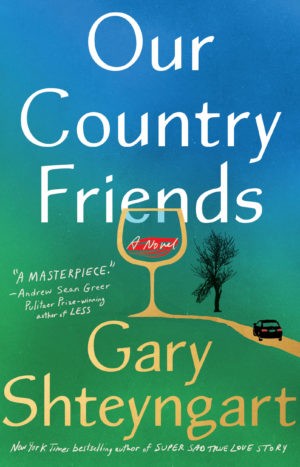Our Country Friends
by Gary Shteyngart
reviewed by Bailey Sincox
For satirist Gary Shytengart— best known for his 2010 dystopian novel Super Sad True Love Story and his memoir Little Failure—no subject is out of bounds. (See his 2021 New Yorker essay on his own circumcision.) But there are a few subjects he always comes back to: immigrants in America, the former Soviet Union, technology, writers and writing.
Shteyngart’s most recent novel, Our Country Friends, revisits these subjects while staying au courant. Sasha Senderovsky flees a pandemic-ravaged New York City with his wife and daughter for their home in the Hudson Valley. The Senderovsky “bungalow colony” then welcomes an eclectic cast of characters: Karen, the developer of a dating app called “Tröö Feelings”; erstwhile writer and adjunct professor Vinod; bon vivant Ed; Dee, essayist, social media personality, and provocateur; and a god among men known only as “The Actor.” Romantic entanglements abound. More importantly, artistic entanglements abound. The “colonists” are all storytellers in their own way. Each vies for artistic self-justification and, with that, control of the narrative within the hermetically sealed bubble they’ve created.
The novel’s premise may sound familiar. In Giovanni Boccaccio’s Decameron, Florentine aristocrats retreat to a country estate during the plague where they pass the time telling stories. But Shteyngart renders his “landowner” protagonist and the “House on the Hill” in shades of absurdity. “Nothing pleased him more than being the ringleader of his country menagerie,” thinks Senderovsky as he welcomes his guests in an expensive dressing gown, “his lips wine purple, the remaining tufts of his untrimmed hair leaning oddly to the side like a stegosaurus at rest.” Shteyngart questions the privilege that allows some to escape disease and attend to the arts at the same time that, as Vinod puts it, there is “a series of refrigerated trucks parked behind his local hospital in Queens, collecting the forklifted bodies of the dead.” The same uneasy feeling arises when the colonists watch “the video footage of the Midwestern murder-by-cop” on their smartphones. Senderovsky thinks he has “risen to the kind of stature that will allow him and his friends, his chosen ones, to outwit the virus and whatever else a collapsing ecology had in store.” But as Shteyngart skewers the very concept of a pandemic novel, Senderovsky, his country home, and his country friends find themselves in jeopardy.
Our Country Friends works precisely because Shteyngart’s satire sinks its teeth (as it so often does) into the author. Alexander Borisovich Senderovsky, like Gary Shteyngart, was born in the Soviet Union but grew up in the United States. Senderovsky, like Shteyngart, writes “comically about the world he had escaped from, of fat oligarchs run amok,” and, like Shteyngart, spends his pandemic days on a sizable property in upstate New York with his wife and child. Shteyngart is not the first to anchor his contemporary-historical novel in autofiction. Louise Erdrich sets The Sentence (2021) in her Minneapolis bookstore; one character is an Anishinaabe novelist named Louise. But Shteyngart is aware that writing about an ongoing crisis on this scale risks both banality and pretension. He neither seeks to define the COVID era nor to document it. Instead, Shteyngart queries his own craft.
Our Country Friends confronts the insufficiency of existing art forms to represent the pandemic. The novel is full of failed art. Ed’s literary magazine Rivers/Fiumi aims for profundity but reeks of elitism. Senderovsky’s television pilot aspires to the comic, comes out tragic, and winds up dropped by the network. Dee’s Gone With the Wind essay attempts self-examination only to offend everyone. The one “good” work of art—Vinod’s novel about his parents’ courtship in Ahmedabad—goes unpublished. “But what if this particular job had suddenly become irrelevant?” thinks Dee. “And what if irrelevancy, not cultural tone deafness, was the real specter that haunted the bungalow colony, haunted her and Senderovsky and the Actor as well?” Our Country Friends limns the limitations of literature in a world saturated with self-reflection by other means. The artists in this novel find themselves living, loving, creating, and questioning under the Argus-like gaze of social media, including Karen’s disastrous app. Ironically, this COVID novel suggests not so much that art is dead as that it might be killing us.
Published on March 15, 2022

